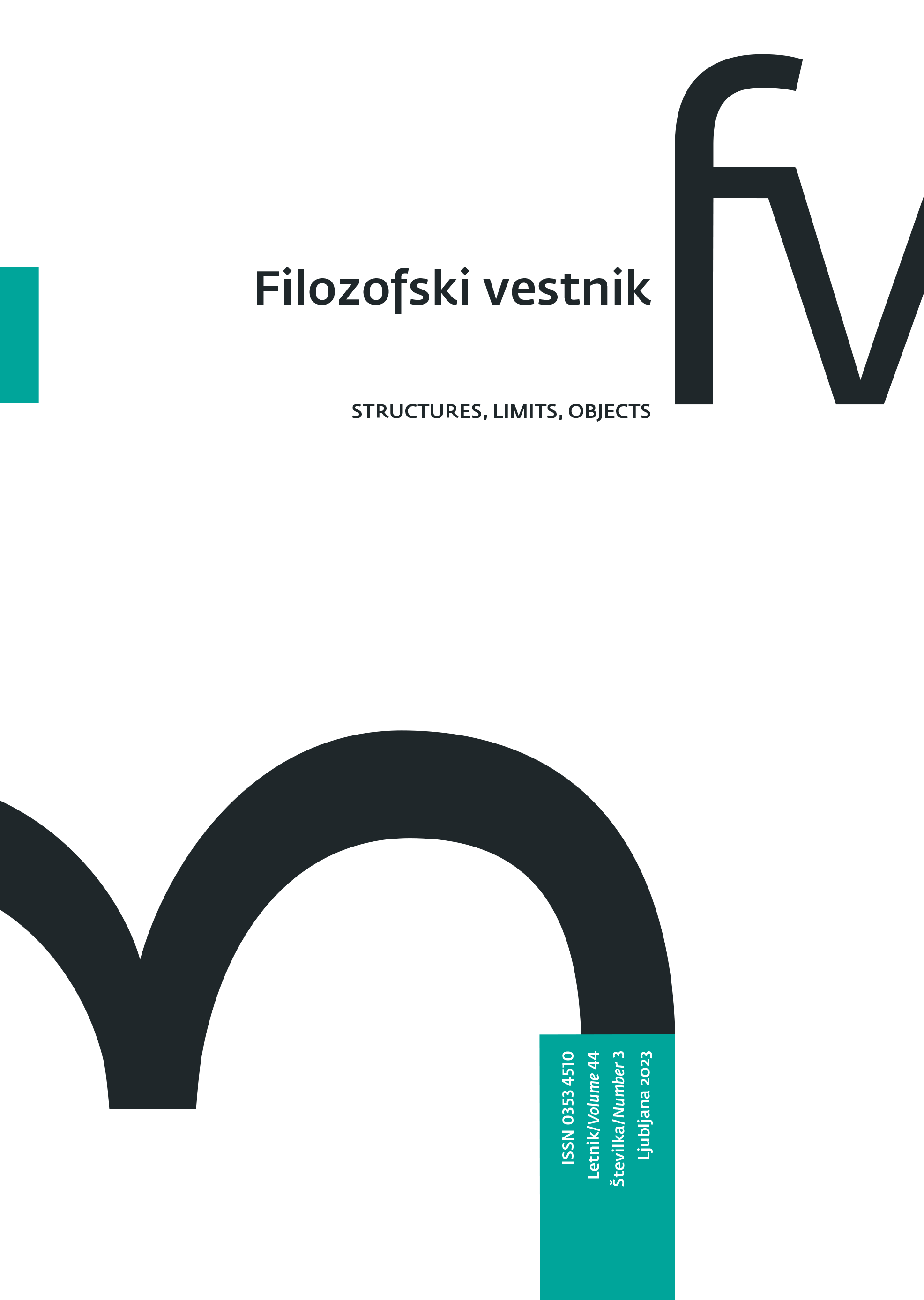O časih, religijah in revolucijah
Eno se združi v dvoje
DOI:
https://doi.org/10.3986/fv.44.3.04Ključne besede:
čas, islam, Eno, ontoteologija, revolucijaPovzetek
Izhajajoč iz vpliva svetopisemskih naukov na islam si prvi del članka prizadeva pokazati različne poti, ki sta jih ubrala krščanstvo in islam, ko sta bila soočena s tremi razsežnostmi časa (chronos, kairos, krisis). Z analizo vrste zgledov, ki ilustrirajo to razhajanje, si besedilo prizadeva osvetiliti različne ontoteologije obeh religioznih diskurzov. Posledično je ontoteologijo islama mogoče povzeti v frazo »Eno se združi v dvoje«, v nasprotju z ontoteologijo krščanstva, ki jo je mogoče formulirati kot »Eno se cepi v dvoje«. V drugem delu članka v družbenopolitičnem kontekstu podrobno raziščemo eno od političnih implikacij ontoteologije »Eno se združi v dvoje« in pokažemo, kako je konceptualizacija tovrstnega konteksta mogoča le z upoštevanjem ontoteološke razsežnosti.
Prenosi
Literatura
Algar, Hamid. “Velayat-E Faqih: Theory of governance in Shi‘ite Islam.” In Encyclopedia of the Modern Middle East and North Africa. Updated August 23, 2023. https://www.encyclopedia.com/humanities/encyclopedias-almanacs-transcripts-and-maps/velayat-e-faqih.
Amir-Moezzi, Mohammad Ali. “Muḥammad the Paraclete and ‘Alī the Messiah: New Remarks on the Origins of Islam and of Shi‘ite Imamology.” Der Islam 95, no. 1 (2018): 30–64. https://doi.org/10.1515/islam-2018-0002.
Amir-Moezzi, Mohammad Ali. “The Shi’is and the Qur’an: Between Apocalypse, Civil Wars, and Empire.” Religions 13, no. 1 (2022): article 1. https://doi.org/10.3390/rel13010001.
Brockopp, Jonathan E. “The Rise of Islam in a Judeo-Christian Context.” In Light upon Light: Essays in Islamic Thought and History in Honor of Gerhard Bowering, edited by Jamal J. Elias and Bilal Orfali, 25–44. Leiden, The Netherlands: Brill, 2020.
Chamankhah, Leila. The Conceptualization of Guardianship in Iranian Intellectual History (1800–1989): Reading Ibn ‘Arabī’s Theory of Wilāya in the Shī‘a World. Cham, Switzerland: Palgrave Macmillan, 2019.
Cole, Andrew. The Birth of Theory. Chicago: University of Chicago Press, 2014.
Comay, Rebecca. Mourning Sickness: Hegel and the French Revolution. Stanford: Stanford University Press, 2011.
Cook, David. Studies in Muslim Apocalyptic. Princeton: The Darwin Press, 2002.
Copjec, Joan. “Battle Fatigue: Kiarostami and Capitalism.” In Lacan Contra Foucault: Subjectivity, Sex, and Politics, edited by Nadia Bou Ali and Rohit Goel, 139–59. London and New York: Bloomsbury, 2018.
Copjec, Joan. “The Imaginal World and Modern Oblivion: Kiarostami’s Zig-Zag.” Filozofski Vestnik 37, no. 2 (2016): 21–58.
Crone, Patricia, and Michael Cook. Hagarism: The Making of the Islamic World. Cambridge: Cambridge University Press, 1977.
Dolar, Mladen. “The Phrenology of Spirit.” In Supposing the Subject, edited by Joan Copjec, 64–83. London: Verso, 1994.
Dolar, Mladen. “What’s the Time? On Being Too Early or Too Late in Hegel’s Philosophy.” In “Hegel 250—Too Late?,” edited by Mladen Dolar, 31–49. Special issue, Problemi International 4 (2020).
Fink, Bruce. “Perversion.” In Perversion and the Social Relation, edited by Molly Anne Rothenberg, Dennis Foster, and Slavoj Žižek, 38–67. Durham: Duke University Press, 2003.
Grueber, Wesley B., and Alvaro Sagasti. “Self-avoidance and Tiling: Mechanisms of Dendrite and Axon Spacing.” Cold Spring Harbor Perspectives in Biology 2, no. 9 (September 2010): a001750. http://doi.org/10.1101/cshperspect.a001750.
Hartog, François. Chronos: The West Confronts Time. Translated by S. R. Gilbert. New York: Columbia University Press, 2022.
Lacan, Jacques. The Object Relation. Translated by Adrian Price. The Seminar of Jacques Lacan, edited by Jacques-Alain Miller, book 4. Cambridge: Polity, 2021.
Mannoni, Octave. “I Know Well, but All the Same . . .” In Perversion and the Social Relation, edited by Molly Anne Rothenberg, Dennis Foster, and Slavoj Žižek, 68–92. Durham: Duke University Press, 2003.
Miller, Jacques-Alain. “On Perversion.” In Reading Seminars I and II: Lacan’s Return to Freud, edited by Richard Feldstein, Bruce Fink, and Maire Jaanus, 306–20. New York: State University of New York Press, 1996.
Nedoh, Boštjan. Ontology and Perversion: Deleuze, Agamben, Lacan. London: Rowman and Littlefield, 2019.
Rosenzweig, Franz. The Star of Redemption. Translated by Barbara E. Galli. Madison: University of Wisconsin Press, 2005.
Ruda, Frank. “What Is To Be Judged? On Infinitely Infinite Judgments and Their Consequences.” In Žižek and Law, edited by Laurent de Sutter, 153–73. Oxfordshire: Routledge, 2015.
Swales, Stephanie S. Perversion: A Lacanian Psychoanalytic Approach to the Subject. New York: Routledge, 2012.
Swales, Stephanie S. “Neoliberalism and Liminality: Perverse Cruelties in the Age of the Capitalist Discourse.” In Lacan’s Cruelty: Perversion beyond Philosophy, Culture and Clinic, edited by Meera Lee, 185–211. Cham, Switzerland: Palgrave Macmillan, 2022.
United Nations High Commissioner for Refugees. “Constitution of the Islamic Republic of Iran.” Refworld. Accessed May 16, 2023. https://www.refworld.org/docid/3ae6b56710.html.
Yip, Zhiqi Candice, and Maxwell G. Heiman. “Duplication of a Single Neuron in C. elegans Reveals a Pathway for Dendrite Tiling by Mutual Repulsion.” Cell Reports 15, no. 10 (June 2016): 2109–17. https://doi.org/10.1016/j.celrep.2016.05.003.
Zupančič, Alenka. Let Them Rot: Antigone’s Parallax. New York: Fordham University Press, 2023.
Zupančič, Alenka. The Odd One In: On Comedy. Cambridge: MIT Press, 2008.
Žižek, Slavoj. Sex and the Failed Absolute. London: Bloomsbury Academic, 2020.
Žižek, Slavoj. Tarrying with the Negative: Kant, Hegel, and the Critique of Ideology. Durham: Duke University Press, 1993.
Prenosi
Objavljeno
Kako citirati
Številka
Rubrike
Licenca
Avtorske pravice (c) 2023 Avtorji

To delo je licencirano pod Creative Commons Priznanje avtorstva-Deljenje pod enakimi pogoji 4.0 mednarodno licenco.
Avtorji jamčijo, da je delo njihova avtorska stvaritev, da v njem niso kršene avtorske pravice tretjih oseb ali kake druge pravice. V primeru zahtevkov tretjih oseb se avtorji zavezujejo, da bodo varovali interese založnika ter da bodo povrnili morebitno škodo.
Podrobneje v rubriki: Prispevki





